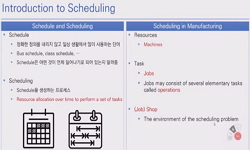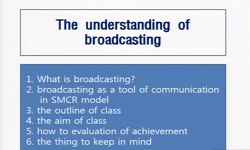Broadcasting is a fundamental problem in the infor-mation dissemination area. In classical broadcasting, a messagemust be sent from one network member to all other membersas rapidly as feasible. Although this problem is NP-hard forarbitrary graphs, it...
http://chineseinput.net/에서 pinyin(병음)방식으로 중국어를 변환할 수 있습니다.
변환된 중국어를 복사하여 사용하시면 됩니다.
- 中文 을 입력하시려면 zhongwen을 입력하시고 space를누르시면됩니다.
- 北京 을 입력하시려면 beijing을 입력하시고 space를 누르시면 됩니다.
https://www.riss.kr/link?id=A108491902
-
저자
Gholami, Saber (Concordia University Ringgold standard institution - Computer science and Software engineering Guy st , Montreal, Quebec H3G 1M8 Canada) ; Harutyunyan, Hovhannes A (Concordia University Ringgold standard institution - Computer science and Software engineering Montreal, Quebec Canada)
- 발행기관
- 학술지명
- 권호사항
-
발행연도
2023
-
작성언어
English
- 주제어
-
등재정보
KCI등재,SCIE,SCOPUS
-
자료형태
학술저널
-
수록면
88-110(23쪽)
- 제공처
-
0
상세조회 -
0
다운로드
부가정보
다국어 초록 (Multilingual Abstract)
As opposed to various applications for the problem of broad-casting with universal lists, the literature lacks any heuristic orapproximation algorithm. In this regard, we suggest HUB-GA:A heuristic for universal lists broadcasting with genetic algo-rithm, as the first heuristic for this problem. HUB-GA workstoward minimizing the universal lists broadcast time of a givengraph with the aid of genetic algorithm. We undertake variousnumerical experiments on frequently used interconnection net-works in the literature, graphs with clique-like structures, andsynthetic instances with small-world model in order to covermany possibilities of industrial topologies. We also compare ourresults with state-of-the-art methods for classical broadcasting,which is proved to be the fastest model among all. Neverthelessof the substantial memory reduction in the universal list modelcompared to the classical model, our algorithm finds the samebroadcast time as the classical model in diverse situations.
Broadcasting is a fundamental problem in the infor-mation dissemination area. In classical broadcasting, a messagemust be sent from one network member to all other membersas rapidly as feasible. Although this problem is NP-hard forarbitrary graphs, it has several applications in various fields. As aresult, the universal lists model, which replicates some real-worldrestrictions like the memory limits of nodes in large networks, isintroduced as a branch of this problem in the literature. In theuniversal lists model, each node is equipped with a fixed list andhas to follow the list regardless of the originator.
As opposed to various applications for the problem of broad-casting with universal lists, the literature lacks any heuristic orapproximation algorithm. In this regard, we suggest HUB-GA:A heuristic for universal lists broadcasting with genetic algo-rithm, as the first heuristic for this problem. HUB-GA workstoward minimizing the universal lists broadcast time of a givengraph with the aid of genetic algorithm. We undertake variousnumerical experiments on frequently used interconnection net-works in the literature, graphs with clique-like structures, andsynthetic instances with small-world model in order to covermany possibilities of industrial topologies. We also compare ourresults with state-of-the-art methods for classical broadcasting,which is proved to be the fastest model among all. Neverthelessof the substantial memory reduction in the universal list modelcompared to the classical model, our algorithm finds the samebroadcast time as the classical model in diverse situations.
동일학술지(권/호) 다른 논문
-
DISCO: Distributed Computation Offloading Framework for Fog Computing Networks
- 한국통신학회
- Tran, Hoa Dang
- 2023
- KCI등재,SCIE,SCOPUS
-
RPL Objective Function for Multihop PLC Network
- 한국통신학회
- Park, Mingyu
- 2023
- KCI등재,SCIE,SCOPUS
-
A Data-Driven Deep Learning Network for Massive MIMO Detection with High-order QAM
- 한국통신학회
- Yu, Yongzhi
- 2023
- KCI등재,SCIE,SCOPUS
-
- 한국통신학회
- Gong, Yu
- 2023
- KCI등재,SCIE,SCOPUS







 KCI
KCI






